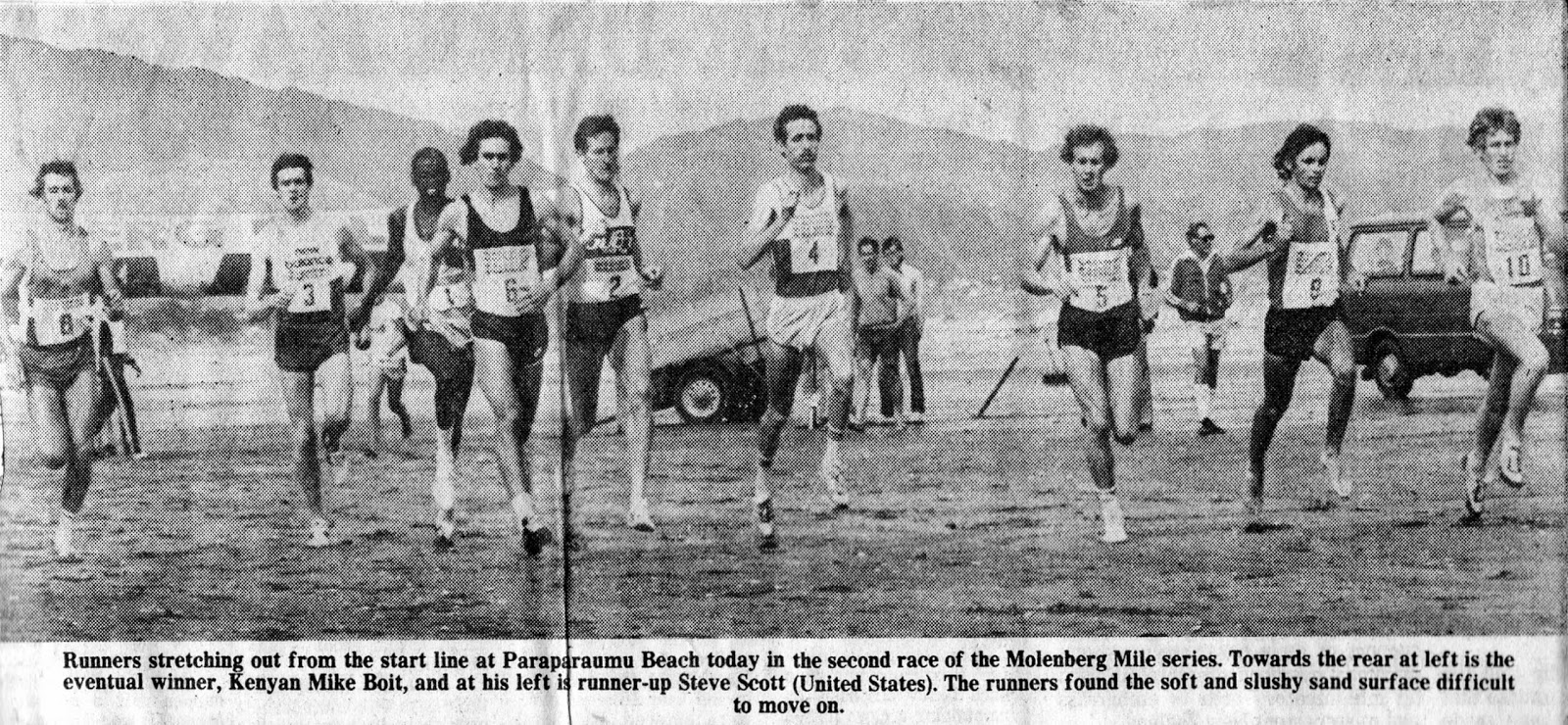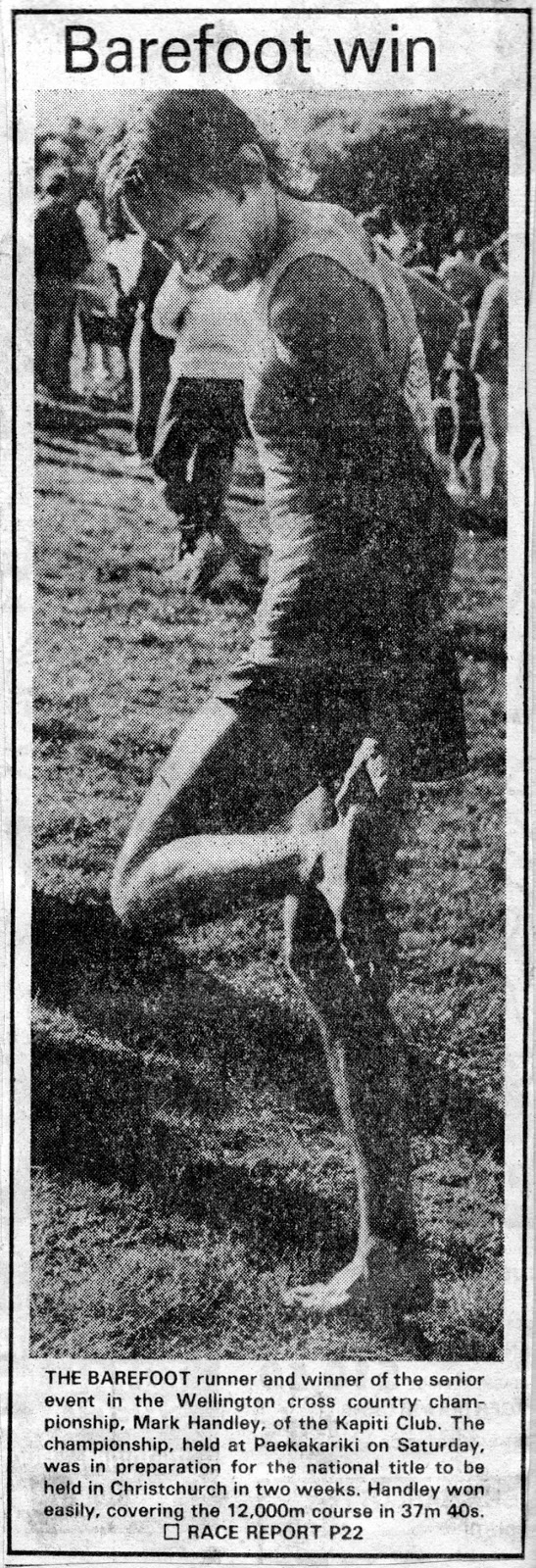Gavin Thorley had a "brilliant" idea based around the concept of a cycling tour. What if you were to do the same sort of thing with runners? The short answer could've been "it's too hard" but it had to be put to the test, so he made it reality.
The inaugural event was held on Labour weekend 1980 and consisted of a prologue and five stages over three days covering a distance of around 69 kilometres.
Prologue
The prologue was a quick "sprint" around the block from the Paraparaumu Domain. No points for tour placings were on offer here but the winner wore the tour leaders yellow T-shirt (a jersey would've been too hot). There wasn't too much racing going on in this stage as we all had in mind the two reasonably lengthy stages coming up later in the day. Steve Hunt took the honours and got to wear the T-shirt for the first stage. However it turned out the T-shirt was too hot for the sunny conditions as well so it was ditched for the rest of the tour.
Stage 1: Paraparaumu - Raumati South
The first stage was 12km from the Paraparaumu Domain down to the Raumati South Hall and was all on the road. Throughout the tour points were awarded for your placing at the end of the stage and also for your placing, on time, over a timed section. On the first stage the timed section was over the last 3.2km so the tactics for this were simple: don't lose too much ground on the leaders and push it over the timed section to cross the line first and also win the timed section. I carried this plan out to perfection running the 9:40 for the last 3.2km and crossing the line first. The photo above is along Marine Parade, Paraparaumu Beach and is before the start of the timed section.
Stage 2: Raumati South - Paekakariki and back
The second stage was 10km of beach and sand dune running which many people found difficult but I reveled in. Again the timed section was over the last few kilometres so the tactics remained the same. I knew my way around those sand hills pretty well so had no trouble following the course. Unfortunately others weren't quite so intimate with the area and when some wags thought they'd move a few of the marker flags around, many got lost. So although Steve Hunt and I managed to clear out from everyone else on this stage and get the best points hauls, the decision was made to erase the stage from the overall total. This was unfortunate for Steve and I as it gave Kerry Cunningham an opening, and he took it.
Stage 3: McKays Crossing - Reikorangi
Just like a normal week's training the longest stage was reserved for Sunday. This was a 17.2km run from McKays Crossing over Waterfall Road and Valley Road to Paraparumu, up State Highway 1 to Waikanae then through to Reikorangi. The timed stage on this one was from Paraparaumu to Waikanae (possibly in an attempt to get people off the main road as quickly as possible) which complicated the tactics somewhat. The photo above is on the unsealed part of Waterfall Road.
Kerry Cunningham made his bid right from the start and disappeared into the distance along Valley Road. I picked up the pace over the timed section and managed to get a better time than Kerry but he held on to his lead through to the finish and ended up with the same number of points as me. Steve had a bad timed section and lost ground to all the others in the top five.
Stage 4: Akatarawa Hill Road
The Monday morning stage of 15km on the Akatarawa Hill Road had its timed section as the first part of the journey. The winner of that section was to be king of the mountains. Now I consider myself to be a pretty good hill climber but didn't have it that day. Steve and Kerry took off from the start with Steve reaching the summit first. Unfortunately Steve aggravated a sore knee on the way down and Kerry overtook him before the finish. My two third places meant that Kerry had closed to within one point of me after the stage.
Stage 5: Reikorangi - Paraparaumu
The final stage of 13km, like the first two, had its timed section at the end so it was back to the trusted tactics. Howard Gregory (who was in fourth place) made the pace for the first part of the stage but once we got to the timed section I ran away from everyone to complete the final 3.2km in 9:58. Kerry was second and Steve had nursed himself over the initial stages and finished strongly to hold on to third place from Howard Gregory and Alan.
My overall running time for the (long) weekend was 3:22:21 (which probably excludes the 10k for the cancelled cross country stage)
This picture was taken at the prizegiving and shows me receiving the cup from Dennis Pickup of Armoured Freightways who sponsored the event. Gavin Thorley, creator of the event, is in the centre.
Subsequent Years
1981 saw a repeat of the three day tour, and I won that too, winning all the stages apart form the final timed stage which was taken out by Neil Froude who held well back and really pushed it over the last 3.2km. My overall time that year was 3:52:21.
In 1982 the tour was shortened to two days with one less stage and a reduction in overall distance to 49km. I won all but one of the stages again. Alan was second and Howard Gregory third. It was the last tour I'd run.
Alan should've won the 1983 event but missed the start of the final stage by 16 minutes and had to salvage all he could by passing as many people as possible on that stage. He managed to work his way through a field of about 120 to get up to salvage 5th place. I'm afraid I can't remember who the winner was that year.
Recently Bruce Blair posted a photo of the 1989 tour featuring Martin McDonald, Patrick Ashkettle and Wayne Duckett. Apparently Martin won that year.
The tour no longer runs and probably the reason for this is "it's too hard".















































